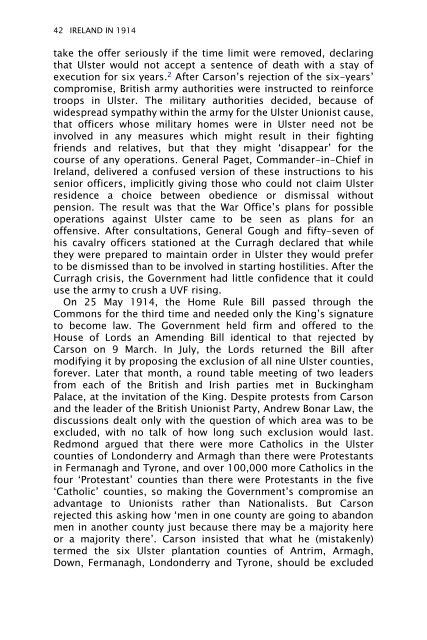Dividing Ireland: World War I and Partition
Dividing Ireland: World War I and Partition
Dividing Ireland: World War I and Partition
You also want an ePaper? Increase the reach of your titles
YUMPU automatically turns print PDFs into web optimized ePapers that Google loves.
42 IRELAND IN 1914<br />
take the offer seriously if the time limit were removed, declaring<br />
that Ulster would not accept a sentence of death with a stay of<br />
execution for six years. 2 After Carson’s rejection of the six-years’<br />
compromise, British army authorities were instructed to reinforce<br />
troops in Ulster. The military authorities decided, because of<br />
widespread sympathy within the army for the Ulster Unionist cause,<br />
that officers whose military homes were in Ulster need not be<br />
involved in any measures which might result in their fighting<br />
friends <strong>and</strong> relatives, but that they might ‘disappear’ for the<br />
course of any operations. General Paget, Comm<strong>and</strong>er-in-Chief in<br />
<strong>Irel<strong>and</strong></strong>, delivered a confused version of these instructions to his<br />
senior officers, implicitly giving those who could not claim Ulster<br />
residence a choice between obedience or dismissal without<br />
pension. The result was that the <strong>War</strong> Office’s plans for possible<br />
operations against Ulster came to be seen as plans for an<br />
offensive. After consultations, General Gough <strong>and</strong> fifty-seven of<br />
his cavalry officers stationed at the Curragh declared that while<br />
they were prepared to maintain order in Ulster they would prefer<br />
to be dismissed than to be involved in starting hostilities. After the<br />
Curragh crisis, the Government had little confidence that it could<br />
use the army to crush a UVF rising.<br />
On 25 May 1914, the Home Rule Bill passed through the<br />
Commons for the third time <strong>and</strong> needed only the King’s signature<br />
to become law. The Government held firm <strong>and</strong> offered to the<br />
House of Lords an Amending Bill identical to that rejected by<br />
Carson on 9 March. In July, the Lords returned the Bill after<br />
modifying it by proposing the exclusion of all nine Ulster counties,<br />
forever. Later that month, a round table meeting of two leaders<br />
from each of the British <strong>and</strong> Irish parties met in Buckingham<br />
Palace, at the invitation of the King. Despite protests from Carson<br />
<strong>and</strong> the leader of the British Unionist Party, Andrew Bonar Law, the<br />
discussions dealt only with the question of which area was to be<br />
excluded, with no talk of how long such exclusion would last.<br />
Redmond argued that there were more Catholics in the Ulster<br />
counties of Londonderry <strong>and</strong> Armagh than there were Protestants<br />
in Fermanagh <strong>and</strong> Tyrone, <strong>and</strong> over 100,000 more Catholics in the<br />
four ‘Protestant’ counties than there were Protestants in the five<br />
‘Catholic’ counties, so making the Government’s compromise an<br />
advantage to Unionists rather than Nationalists. But Carson<br />
rejected this asking how ‘men in one county are going to ab<strong>and</strong>on<br />
men in another county just because there may be a majority here<br />
or a majority there’. Carson insisted that what he (mistakenly)<br />
termed the six Ulster plantation counties of Antrim, Armagh,<br />
Down, Fermanagh, Londonderry <strong>and</strong> Tyrone, should be excluded








